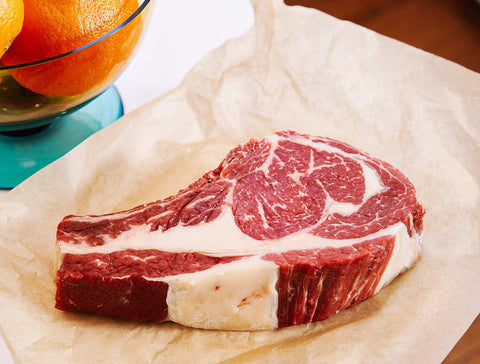Welcome to Hagen's Bites - our series of juicy meat information in a bite-sized format. Coming at you every fortnight.
What is organic meat in Australia?
Organic meat refers to the principles used to produce, process and retail meat products. Organic meat is raised without synthetic pesticides, herbicides, hormones and antibiotics. How the animals are cared for throughout their life (how they live, what they eat), and leading up to their death matters too.
How organic animals live
Organic animals must have access to pastures/paddocks with plenty of space to move around and exhibit their natural behaviours including scratching around in the dirt and playing in their social groups. This is often referred to as free-range, pasture raised, or paddock raised (although these terms mean slightly different things, they’re often used interchangeably).
Certain types of livestock also need to be supplied with a shelter to ensure they have safety and access to protected environments to ensure they stay safe during adverse weather or predators.
Animals are treated humanely and are cared for by farmers who value and respect their animals.
What organic livestock eat
Organic livestock must be pasture fed (e.g. eat the grasses in the paddocks) or fed on seed/grain that is also (certified) organic (e.g. grown without pesticides and herbicides and is grown environmentally consciously).
The animals must have access to clean and safe drinking water
How they’re slaughtered
Organic standards apply even after the animals have left the farm. This means, how they are transported (if it’s safe and has welfare of the animals in mind – e.g. not 200 chickens jammed into the back of a small truck), how far they have to travel (traveling long distances puts pressure and stress on the animals so travel needs to be kept to a minimum) and how the animals are killed at the abattoir – humanely with respect to the animal.
What’s the difference between organic and certified organic?
Not all organic meat products are created the same. The word ‘organic’ is not regulated under Australian law, this means it can essentially be used in relation to any product regardless of how it has been produced.
This is a serious problem for consumers who are often misled by deceptive marketing tactics. Many companies tend to take advantage of the use of the word organic and leverage it within current organic trends.
There’s ‘organic’ and ‘certified organic’. In many cases organic refers to producing meat in accordance with the organic farming philosophies including each link in the chain of how the animals are raised, what they eat, how they’re treated (all of the points noted above). However, if a producer does not meet of the links in the organic chain that meat cannot be certified organic. An example of a farm producing meat in accordance with organic principles but not qualifying for organic certification;
If a farm raises their pigs in accordance with organic farming principles giving them access to open paddocks, clean water, low stocking densities, and shelter but cannot feed their pigs certified organic grain due to low availability or access. To keep their pigs alive and with nutritious feed, the farmer may have to bring in grain from non-certified organic grain producers.
The cost for application to a certified organic governing body for certification is also a barrier for some smaller producers who cannot afford the high application fees when their turnover of meat is small.
Certified organic refers to the formal recognition by a local governing body that the meat has been raised, slaughtered and retailed in accordance with their guidelines minimums. These minimums vary between governing body but generally provide a good baseline for purchasing meat you’re unfamiliar with.
If you use a trusted retailer/supplier/farmer meat may also be organic and follow all the same practices but not certified.
BITE SIZE
- There is a difference between ‘organic’ and ‘certified organic’
- Organic livestock are raised in accordance with organic principles that respect the animal and the earth
- Animals must be treated with respect, raised with their welfare in mind – rather than as a product
- Speak to your local butcher, farmer or retailer about where the meat has come from and how it’s raised to get a better understanding when purchasing meat







